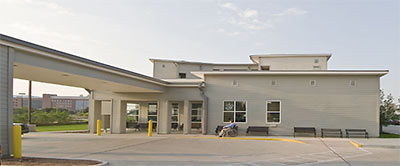
The Hospitality Apartments at 7300 Bertner just north of OST are “not posh. But they’re perfectly nice,” explains Ann Hightower, whose husband Joe founded the organization that runs them 42 years ago. “Totally functional, with linens, dishes, a stove and oven, a microwave, TVs and access to free laundry.”
Where’s the swimming pool? There isn’t one, but that’s not usually too much of a concern of the people staying there. All the residents of the 42-unit complex are out-of-towners undergoing treatment at the nearby Texas Medical Center.
Joe [Hightower] estimated the apartments have been filled “99-plus percent of the time†over the years.
“You could probably have four projects this big in Houston and just barely meet the demand,†Ann said after the organization’s annual meeting on Super Bowl Sunday. “And then you would uncover another layer of need.â€
Residents stay anywhere from 2 weeks to 3 months — for free.
The nonprofit has never applied for or received money from any government agency. The organization has relied on personal fundraising efforts by the Hightowers and friends and the generosity of Houston congregations, private foundations and hundreds of individual contributors. It has no debt, pays no salaries and operates each apartment for less than $10 a day.
***

At the annual meeting of trustees this week, more than 75 volunteers detailed efforts to address a punch list of construction issues, landscape and extend the gardens around the complex and install a robust Wi-Fi system for residents with the assistance of personnel from the University of Texas M.D. Anderson Cancer Center. The equipment and installation are being supplied by MCA Communication and Cisco at no charge to the foundation.
The Hospitality Apartments were established in 1968, but the facilities are more recent:
The new building completed three years ago replaced four two-story buildings cobbled together by Hightower and his team over the decades. M.D. Anderson bought the former apartments five years ago to facilitate a planned expansion; Bertner Avenue now runs right through where they once stood, and the new apartments, 50 yards to the west, stand on land the hospital traded for the original plots.


- Homes are where the heart is [Rice News]
- Hospitality Apartments
Photos: Hospitality House (top 2 by Paul Hester]





Purely wonderful in every way. Bless the Hightowers and every volunteer.
I second your Hallelujah!
I would say that our government could learn from the Hightowers but in reality the Hightowers are the exception to the rule and most of the other “Hightowers” have learned from the government and have never met a donation they couldn’t find a way to waste. Usually on a new BMW for the executive director.
But it’s nice to know some know the meaning of charity and giving back to the community and taking care of each other.
That’s a mighty sweeping statement, Matt M. What is the source of the facts and figures upon which you’re making it?
Researching sources and uses of income of a nonprofit isn’t difficult. Nonprofit organizations are required to file an IRS 990, which becomes public record. Furthermore, they should have an audit every two years if for no other reason than grantmaking foundations often require one. A responsible lay board, to which the director reports, balances staff salaries (respectable enough to attract and retain real talent) with expenditures on the organization’s mission.
You won’t find “a new BMW for the executive director” in the budget or the philosophy of a responsible nonprofit. Implying that that is the norm discredits the good work of these organizations, their volunteers and staff. And as inaccurate, it also discredits your own praise of the Hightowers.
What is the source of the facts and figures upon which you’re making it?
_________________________________
30 years of “hands-on” experience with non-profit organizations not only here but around the country. Community organizations, international organizations, and most of the “arts and crafts” chi-chi organizations.
One of the executive directors of a local chapter of a national organization had a “cash room” which was used for “odds and ends” most of which were “odds and ends” for the executive diretor. Who was finally urged to “move on” after several of the board members with scruples, a rarity on most boards, found out about it.
My introduction to non-profit was 31 years ago when I worked for United Way. I wouldn’t give United Way a dime as a result.
Most non-profit organizations would never survive a full audit by the IRS. Unfortunately the IRS rarely audits non-profit organizations.
As for this “respectable enough to attract and retain real talent” the defense of some of the truly amazing salaries for some is that they would earn as much or more in the private sector. So let them go earn it in the private sector.
Nice, Matt. So, no good deed goes unpunished?
Nice, Matt. So, no good deed goes unpunished?
________________________
Never does. As I know from experience. The Hightowers are the exception to the rule. But they are an example. The point is, which you are missing, they are the example that others should follow.
I never knew this place even existed. BRAVO to the Hightowers and all the volunteers that make this project possible.
Such a great story. Makes me wish I had the money to give them another wing of apartments.
Jen, you may not have the money to give them another wing but you can always give them your time. It sounds like they use volunteers.
Miz Brooke, I work for one of the largest not-for-profits in Houston and methinks you are quite naive.
iLackTact, maybe you should work for a smaller one.
I don’t work there to “advance mankind” or “feel all warm and fuzzy inside”. It’s a job and I’m collecting a paycheck.
So if you’re just there to collect a paycheck, what’s wrong with getting paid what you’re worth? And if it’s such a problem for you at a nonprofit, then why not go to work at a commercial business?
Yea! It’s the Private Not-for-Profit Guessing Game.
Which Houston Private Not-for-Profit pays its President .75 mil/year (2007 Form 1990) and has eminent domain power given to it by Texas Legislature about 1955 (can take tangent residential homes WITHOUT open meetings)?
I’m really torn about whether or not I should submit this. I do think some Not-for-Profits are wonderful organizations and some may have a “TOO BIG To FAIL” mentality.
oooh oooh oooh! is it Metro? what do I win?
Miz Brooke, I have no complaints about working for a not-for-profit. I have a nice job and respectable paycheck. I guess my original point was not very clear. What I really meant was that you are naive if you think there is not a lot of waste and corruption in not-for-profits and non-profits just like there is in the corporate or government sectors. I agree that what the Hightowers are doing is great and I wish there were more foundations like them. The amount of money that some not-for-profits deal with is sickening. I know that not all of those funds make it to our “core mission”. We do file a 990 each year but like all large businesses we have very complex accounting and sometimes it can be rather “creative”. And yes, most of the time the boardmembers are clueless and just as naive.
iLackTact, believe me, I know about waste, mission creep and how money can distract staff and leadership from good stewardship and the core mission. It’s the work of wonderful people like the Hightowers that should remind (or shame) insulated CEO’s, Exec VP’s or board presidents what their organizations are really supposed to be about.
And Squished, yeah, that’s gotta be Metro, which is a whole ‘nother universe of bad management.
Sounds like Miz Brooke Smith had a change in tune once someone from “within” verified what I’ve observed through the years
“without” and there are very few organizations in Houston I would give a dime or another moment of my time to. The term “non-profit” is very misleading and “upper management” would never earn what they do in the private sector. As do board members whenever possible. Particularly the ones who “recommended” the executive director.
Sounds like Matt Mystery should get himself on a board (upaid, purely volunteer) and start righting wrongs.
Nope, NOT Metro.
Doh! I forgot. It’s the Texas Medical Center.
Sounds like Matt Mystery should get himself on a board as an unpaid volunteer and start righting wrongs.
__________________________
Years ago I co-founded an organization with a friend of mine and both of us trusted a third person who substituted the incorporation papers and who then proceeded to send notices to “our” board which in fact were never sent but copies kept in files and then she fired the board on the basis they never showed up and then proceeded to rip off almost $200,000 in public funding. The AG’s Office never did retrieve the money and she simply closed down the organization before we could file suit to “retrieve” the organization.
The boards of organizations are fully aware of what goes on. In many cases there are “conflicts of interest” that benefit the board members.
It is easier to just have a list of organizations that don’t deserve funding and to send it around as they say.